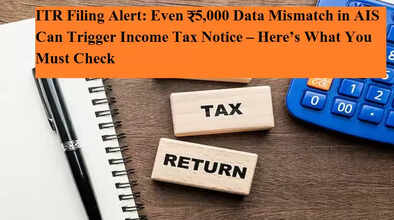ITR Filing Alert: Even ₹5,000 Data Mismatch in AIS Can Trigger Income Tax Notice – Here’s What You Must Check

As the deadline for filing Income Tax Returns (ITR) for Assessment Year 2025-26 approaches, the Income Tax Department has intensified scrutiny of taxpayers, particularly those with higher incomes. One of the key reasons behind sudden tax notices this year is data mismatch in the Annual Information Statement (AIS). Tax experts caution that even a small discrepancy, as low as ₹5,000, can result in a notice from the department.
Why AIS Data Matters in ITR Filing
The Annual Information Statement (AIS) is a consolidated record of a taxpayer’s financial transactions. It contains details of income earned, tax deducted, and high-value transactions reported by banks and other financial institutions. When a taxpayer files their return, the Income Tax Department automatically compares the details provided in the ITR with the information available in AIS.
If there is any mismatch, the system generates an automated notice. This is why experts strongly recommend cross-checking Form 16, Form 26AS, and AIS before filing returns.
Small Mistakes, Big Trouble
Sujit Bangar, Founder of Taxbuddy.com, highlighted how even minor negligence can cause major headaches. Citing a case, he explained that a taxpayer received an Income Tax notice simply because he failed to declare interest income of just ₹5,000. Many taxpayers ignore small amounts of savings account or fixed deposit interest, assuming it is insignificant. However, the department considers non-disclosure, even of small sums, as underreporting of income.
Such cases underline the importance of reporting every source of income, no matter how small.
Key Points to Remember While Filing ITR
To avoid notices, taxpayers should carefully follow these guidelines:
-
Report interest income correctly: Bank interest must be declared under Schedule OS on a gross basis. Do not deduct charges before reporting.
-
Declare full dividend income: The entire dividend amount must be disclosed without reducing transaction fees or other charges.
-
Report capital gains accurately: Details of equity and mutual fund capital gains mentioned in AIS should match your ITR.
-
Rental income disclosure: If you earn rental income, it must be reported under Income from House Property along with TDS deductions. The data should align with AIS records.
Failing to follow these steps can result in a mismatch, increasing the risk of receiving an income tax notice.
Extra Scrutiny for High-Income Taxpayers
For AY 2025-26, the Income Tax Department is paying special attention to taxpayers who pay higher taxes. According to Bangar, individuals with annual income exceeding ₹1 crore must disclose their assets and liabilities in Schedule AL at the end of the year. This disclosure helps the department assess whether income declarations are consistent with the wealth held by taxpayers.
File ITR Without Delay
Tax experts also advise against waiting until the last moment to file returns. The closer the deadline gets, the heavier the system load becomes, leading to potential delays or technical issues. Filing early not only ensures smooth processing but also increases the chances of receiving refunds faster.
Key Takeaway
The message is clear: don’t ignore your AIS while filing ITR. Even a small discrepancy of ₹5,000 can invite scrutiny from the tax department. Review your Form 16, Form 26AS, and AIS thoroughly before submitting your return. Transparency and accuracy are the only ways to avoid unnecessary notices and penalties.
With the Income Tax Department tightening checks on high-value taxpayers and monitoring every mismatch, timely and careful ITR filing has become more crucial than ever.

